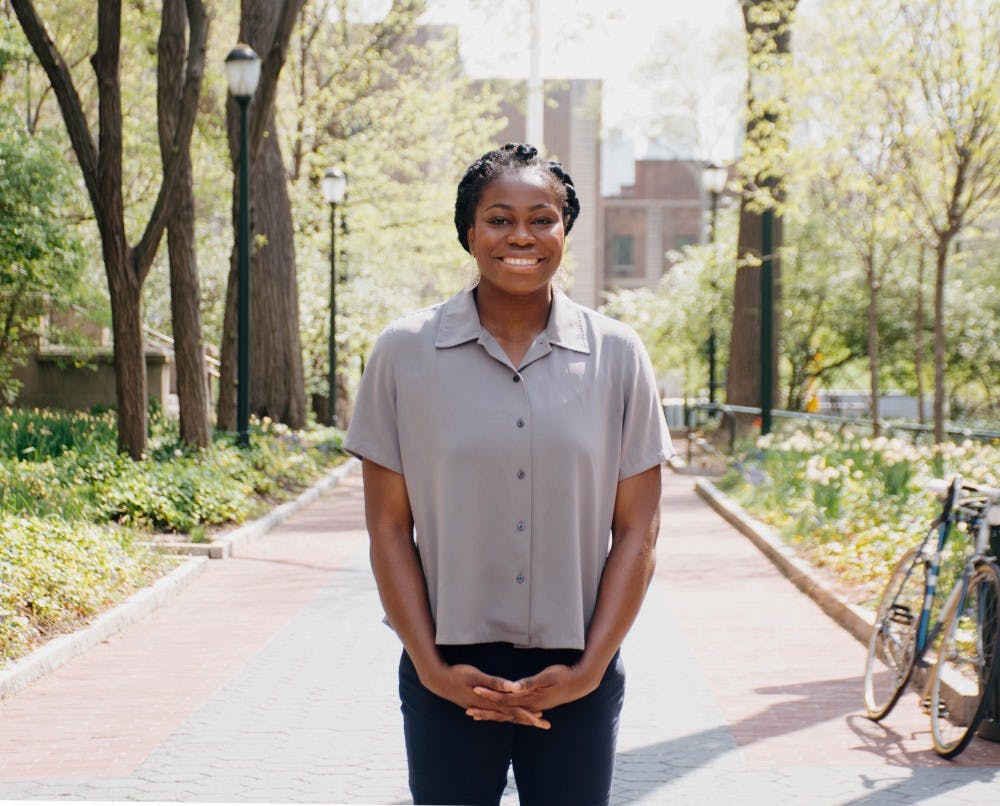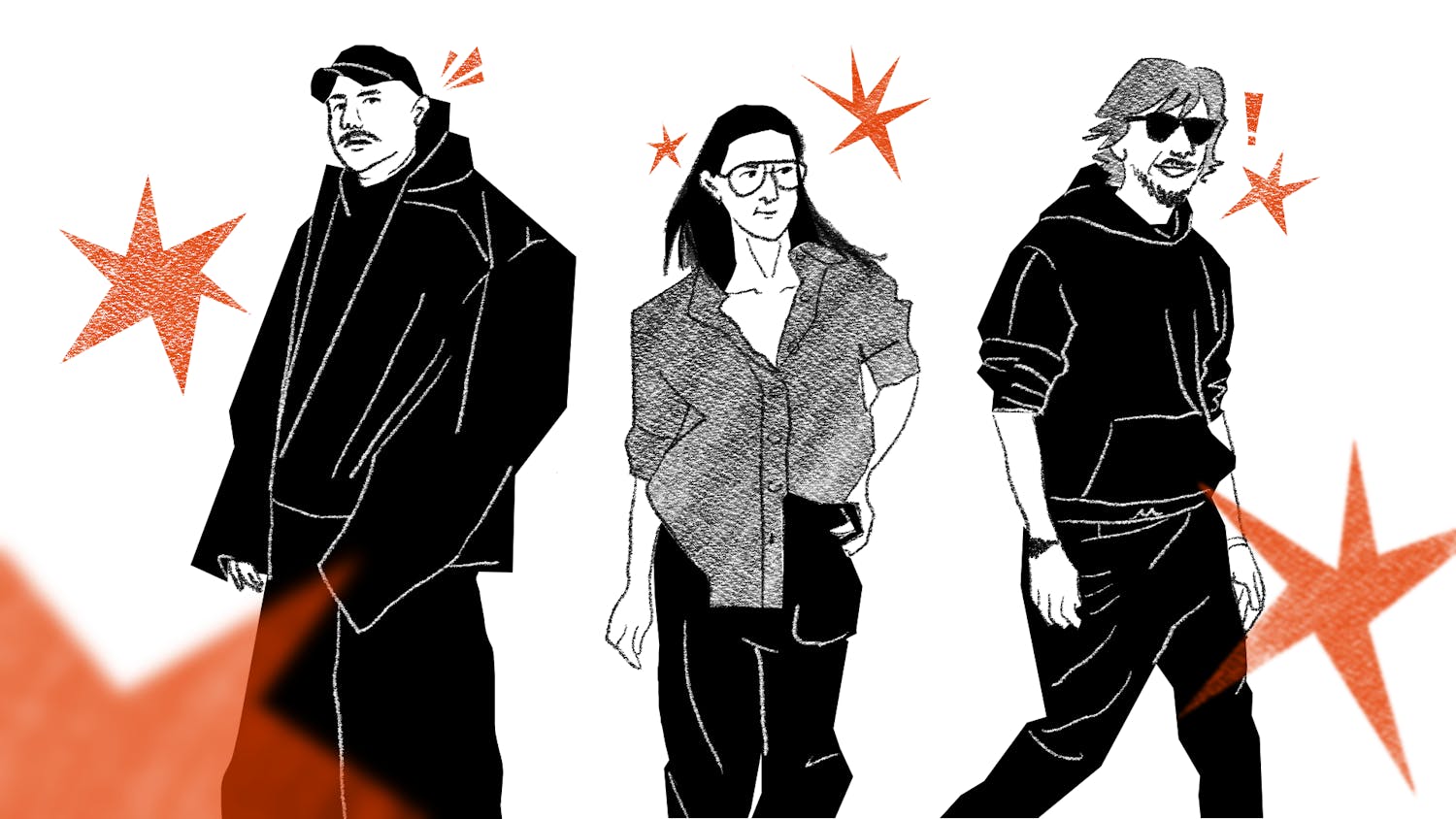Princess Aghayere (C'19) remembers waking up at 6 a.m. to teach basketball to teenage boys in Rwanda.
"That was really fun," Princess recalls, smiling. "A lot of them were my age, and they just looked up to me."
She was at the Agahoza Shalom Youth Village on a service learning fellowship with Penn Hillel during her freshman year. The kids she taught attended a school for orphaned children.
A basketball player at Penn, Princess showed them how she played, and "that was the start of me teaching basketball in the continent."
She notes that she'd been thinking about the President's Engagement Prize since her sophomore year, because she knew it would help her make an impact. Being from Nigeria, Princess always wanted to pursue an initiative in international development.
During their sophomore year, Princess and Summer Kollie (C'19) applied for a grant through the Davis Projects for Peace, a foundation that supports youth ideas for building peace.
"That was something we always wanted to do—we'd read up on the projects, and thought it was a great opportunity," Princess remembers.
Around winter break, they had the idea to build a basketball court with the $10,000 grant they received from the Davis Projects for Peace grant. "Basketball is on the rise," Princess believes, because it holds the potential to engage youth in ways that other activities can't. She observed that in developing countries, there aren't as many clubs and resources for kids to become involved in.
The summer after her junior year, Princess and Summer used their grant to partner with SOS Children's Villages in Liberia.
Princess explains that she and Summer decided to work in Liberia because it "is a much smaller country, with a lot less red tape and bureaucracy to maneuver."
The country is also still recovering from a 14 years of civil war, a brutal period that has taken its toll on children, especially in the education system. Only 44% of primary age students attend primary grades, according to USAID. The literacy gap also illustrates a staggering disparity—in urban Liberia, for instance, 60% of women, as opposed to 86% of men, are literate. In rural secondary schools, the net attendance percentage is 6% of girls, and 13% for boys.
In light of this conflict, Princess and Summer used their grant to reconstruct a basketball court, hold basketball clinics, and teach personal development workshops for adolescent girls in Monrovia, Liberia's capital.
The program integrated basketball with workshops into the girls' weekly schedule: on Mondays, Wednesdays, and Fridays, they would play basketball, and during the rest of the week, they would attend educational workshops taught by Princess and Summer, including one on sexual health.
"We wanted to expand on the idea of literacy—for girls to utilize computers and have books," Princess explains.
Their workshops were a remarkable success.

"We had a really good attendance rate, 85%. And none of the girls missed our workshops," Princess says. She believes this was in part because "they were able to build relationships with the other girls in the community. The girls said they wanted to continue and wanted us to come back."
Towards the end of the summer, Princess and Summer had collected data, conducted interviews in Monrovia, learned about the serious literacy gap between men and women, and ultimately felt "prepared to undertake a greater task."
They began to formulate the idea for Rebound Liberia, one of three projects that won the prestigious President's Engagement Prize. In addition to basketball and development workshops, they addressed the literacy gap in the country.
Oladunni Alomaja (E'19), also joined the Rebound Liberia project, bringing to the team a background in implementing reading initiatives.
The proposal includes building an indoor basketball court, maintaining personal development workshops (such as workshops for sexual health and drugs), providing food and giveaways, and a resource center. This resource center would include a room for books, a room for people to read and present, and possibly an Internet café. Princess, Summer, and Ola also want to hire security, a basketball coach, and individuals to teach the workshops, depending on their budget. Rebound Liberia will cater to 60 kids from all over Monrovia.
The vision is to empower girls to assume leadership positions. Princess hopes that "in five years, a girl could transition to being a helper or mentor or doing the summer programs and eventually holding even higher leadership positions."
The Rebound Liberia team is advised by Dr. Ocek Eke, Director for Global and Local Service Learning Programs at Penn Engineering.
"I've known him [Dr. Ocek Eke] since my sophomore year; I've been on two of his service learning trips to Ghana and Rwanda," Princess says. "He's been great and very enthusiastic, and helped us out with the thinking process."
Princess will graduate as a Health and Society major with a minor in Political Science this spring. She wanted to study public health because she thought the health sector was the best way to help people. "As a junior, I realized that sports is an important part of growth and development, so my role doesn't always have to be medicine."
Basketball has been "pivotal in shaping who I am," Princess says. "It is my story and how this idea [Rebound Liberia] came about."
Rebound Liberia is holding a book drive in May for the Penn community to donate any books. The books will go to adolescent girls, ages 8 to 16, in Liberia. Princess asks for anyone interested in donating to email her at aghayere@sas.upenn.edu.







